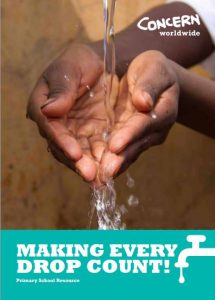“Water is essential for life, health and human dignity – our water supply around the world is not shared equally”
The pack sets out to foster an appreciation of the ways in which people use this precious resource, and to appreciate the need to conserve water and to recognise and investigate human activities which may have positive or adverse effects on the environment.
The pack was produced by Concern to coincide with International Year of Water Cooperation (2013) and offers teachers a number of ideas for exploring the interconnections between the lives and behaviour of people in Ireland, and our impact on water quality and supply, and on climate change.
The resource includes a Water Calendar of UN and world days of action and awareness, helping to maintain a focus on related issues throughout the school year.
The pack is laid out to move pupils from learning about the importance of water in their immediate lives to an understanding of deeper issues of social justice and sustainability in the wider world.
The pack provides
- a comprehensive range of activities and lesson plans on the theme, starting from an understanding of the vital role of water in our lives, to a discussion of more political questions of water justice, addressing the allocation in our homes, the clothes industry and in agriculture.
- There are examples of Concern’s work on water throughout the pack, one of which features the work of Gloria Kafuria, a water engineer living and working in Tanzania.
- Activity sheets, a word search and curriculum links to the senior primary (more info below)
Contents:
- Where water comes from – Exploring water sources in pupils’ homes and in the Developing World.
- Why water is important – Importance of water for hygiene and sanitation
- Water: A renewable but limited resource – Science-based activities on the water cycle, measuring rainfall etc.
- Uses of water – Comparing average water consumption in Ireland and in Developing world communities, with useful information on water consumption in various industries.
- Global water issues
- Millennium Development Goals – A snapshot of progress and challenges on MDG 7, Target C, which aims to “Halve, by 2015, the proportion of the population without sustainable access to safe drinking water and basic sanitation.”
- Concerned about water
- Water works in schools – Examples of Concern’s work providing water and sanitation in schools.
- Climate Change and Water – Causes and Effects presented in a short and accessible handout.
- Drought – Case study of the 2011 East African drought, linked to an activity on energy consumption in our homes, and climate change.
- Flooding – Case studies from Ireland and Pakistan
- Emergencies – Information on WHOs’ guidelines for minimum amount of water we each need to survive, and for basic hygiene and cooking. Focus on the urgency of providing water for people facing emergencies, with a case study from Haiti.
- Water related diseases – Information on the impact of malaria and diarrhoea and water-borne diseases such as typhoid and cholera which claim the lives of 4,800 people every day.
- What we can do – Practical suggestions for water conservation in our daily lives
- Glossary
- Links
- Calendar
Suggested use
The pack is designed to complement the SESE, Geography and Science curricula, but activities are also included for use in English, Drama and PE.
On page 12 there is a link to a video narrated by Tanzanian water engineer Gloria Kafuria, produced by Concern to celebrate International Women’s Day which will be useful to educators frustrated by the scarcity of material highlighting the voices and contribution of women from the Global South.
On 19 page there is information on the potential use of the Moringa Tree, which apart from producing highly nutritious pods, oil, bio fuel and fertiliser, for natural water filtration, which may be of interest in projects on sustainability.

